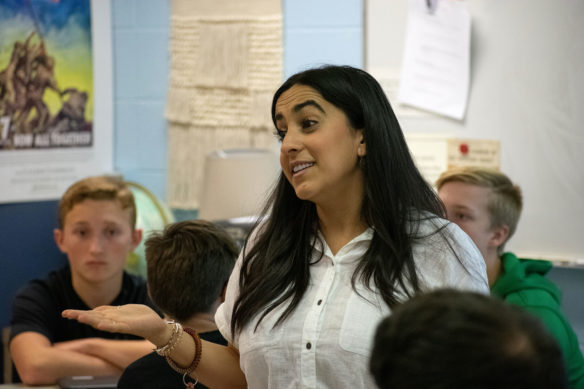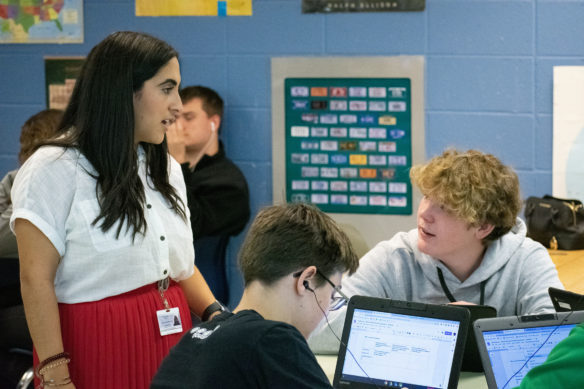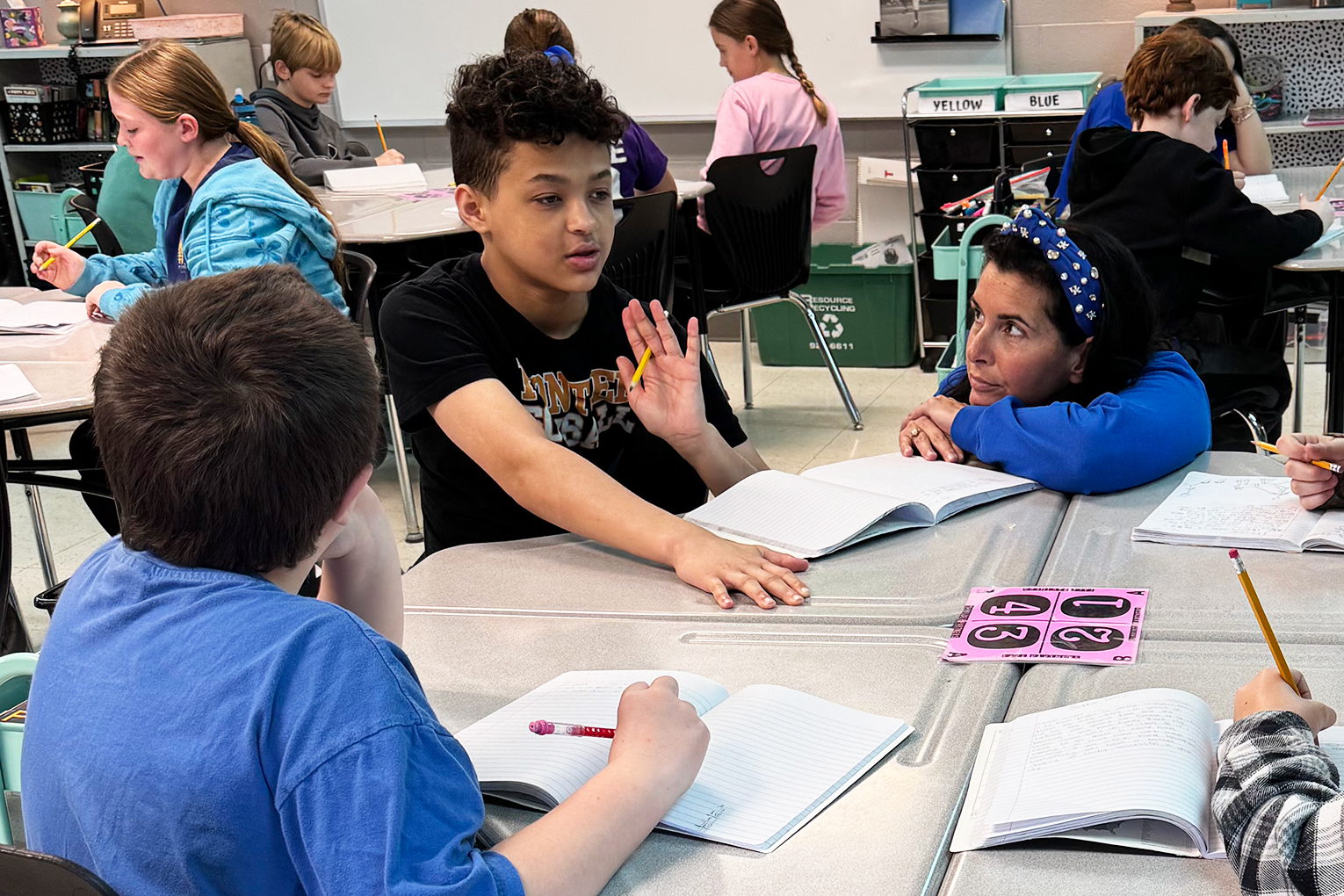
Summer Amro, a second-year social studies teacher at Woodford County High School, teaches her class about World War II. Woodford County Public Schools’ Teacher Induction and Mentoring Program provides support for new teachers while providing experienced teachers with leadership opportunities.
Photo by Jacob Perkins, Sept. 17, 2019
- The Woodford County induction program provides support for new teachers while providing experienced teachers with leadership opportunities.
- The program allows for a smoother transition, as was the case with Summer Amro and other new Woodford County teachers.
By Jacob Perkins
Jacob.perkins@education.ky.gov
When funding dried up for the Kentucky Teacher Internship Program (KTIP), districts were left with a choice. Wait for the possibility of KTIP funding being restored or create their own program. Woodford County chose the latter.
“Our goal is to provide teachers with the support that they need,” said Woodford County Chief Academic Officer Jimmy Brehm. “(New teachers) don’t know what questions to ask until they’ve actually started working.”
The Woodford County Public Schools Teacher Induction and Mentoring Program, which was created in 2018, provides support for new teachers while giving experienced teachers leadership opportunities. The mentor and mentee teachers are matched through consultation between the school and central office. The match is determined based on school location, subject area or grade level.
A teacher mentor meets no more than twice per month to provide support in whatever the new teacher may need help in. This can include preparation for a strong start to the school year, short- and long-term planning in the classroom, and assisting with implementing and refining research-based best practice in classroom instruction.
Both the mentor and mentee are required to complete a minimum of 30 hours of out-of-class time together and 15 hours of in-class time. The mentor keeps a log to track the date and time of activity, focus of conversation and work, and commitments and action steps made by the mentee.
For their additional work, mentors receive a stipend that is comparable to what a resource teacher received with KTIP. This was approved by the Woodford County school board and it was added to the salary schedule before the program began. The first-year teachers also are paid for any after school training that they participate in as part of the program.
Additionally, the mentor will observe their mentee’s classroom instruction on a regular basis and provide constructive, non-evaluative feedback. This is a key difference between the induction program in Woodford County and KTIP. Brehm said that by having the program set up in this manner, the teachers will have more of a sense of community with one another.
“We don’t believe that a mentor should be a part of evaluation,” Brehm said. “The second somebody is rating you on your job, especially to your boss or with your boss, that takes away from the mentor relationship.”
Brehm said it’s not only the new teacher who is getting something out of these relationships.
“Anytime that you’re involved with having to support someone else in best practice, you naturally are spending a lot of time reviewing your own practice,” Brehm said. “When you get to dig into the standards of excellence or whatever it is that you’re looking at, you naturally become a better teacher yourself.
“If you want to know if you really know something, go teach it to somebody. That’s a huge piece that we’re getting out of this mentor relationship. The mentee is getting a ton, they’re getting the most. But our mentors are getting the opportunity to say, ‘Okay, let me reflect on my own practices while we’re having this conversation.’”
Summer Amro, a second-year social studies teacher at Woodford County High School, may be new to the profession, but she said that she still is able to provide some tips to her mentor along the way.
“I was in a PLC (professional learning community) with (her mentor) and there were many times that I gave her ideas and she used them,” Amro said. “I definitely took a lot more tips from her because I was newer and I didn’t have as many resources. Still she’ll come to me and say, ‘This just happened. I don’t know what to do.’
“And it’s just really nice because it makes me more willing to ask her for help when I know that she respects my opinion and she respects what I’m doing in my classroom.”

Summer Amro answers questions from a group of students in her class at Woodford County High School. Amro said she appreciates the collaborative aspect of the Woodford County teacher induction program.
Photo by Jacob Perkins, Sept. 17, 2019
An aspect of the Woodford County induction program that Brehm takes pride in is the clear vision and career ladder for its teachers. He said that it was important for the district’s induction process to mirror the reflective practices that are important to the National Board for Professional Teaching Standards (NBPTS).
The training for Woodford County’s teacher induction program initially began with a grant from NBPTS. Brehm and Kentucky Department of Education Academic Program Consultant Misty Higgins were able to train the five core propositions of the National Board.
By focusing on these propositions, Brehm and Higgins were able to create an induction program that shared the same career trajectory as NBPTS.
The goal is to start the teachers in the induction program and by their fifth or sixth year, they will hopefully become a National Board Certified Teacher. Amro, while in her second year, is excited that her district has goals set for her and is working with her in order to achieve them.
“In terms of long-term things like National Boards and continuing education as a teacher, this program has not only encouraged setting those goals, but has established that climate and culture for reflection, which is what all of those programs are about,” she said.
Brehm recommends that districts interested in setting up a similar induction program should start with their local board of education.
“It’s always important that your board of education is on board with the principles of (the program),” he said. “They have to share in your belief that the most good we’re going to do for students is making sure that we have the most highly trained, highly skilled teachers in the classroom.”
Brehm said the induction program is not expensive to start. Woodford County’s first year was mainly funded at the local level, but has since been mainly funded by its Title II funds.
“We’re not getting the same number of applicants,” he said. “We realized that this is where we need to spend the bulk of our Title II funds, on teacher induction and retention. … That’s the appropriate use of those funds. To make sure that we’re supporting teachers in their classrooms. We’ve really moved a lot of our Title II perspective into teacher induction and recruitment.”
Amro said that districts that are considering implementing a similar induction program should take into account its district-wide needs when considering support for its new teachers.
“I won’t say that every district should have the same exact setup that we have, because every district is different and every district has different needs,” she said. “Whether it’s the same structure or not, and whether new teachers are asking for it or not, I can promise you, new teachers need support. They at least need to know that it’s there.
“The culture that the program has established here is wonderful and it made me want to stay.”
MORE INFO …
Summer Amro summer.amro@woodford.kyschools.us
Jimmy Brehm jimmy.brehm@woodford.kyschools.us
Misty Higgins misty.higgins@education.ky.gov




Leave A Comment